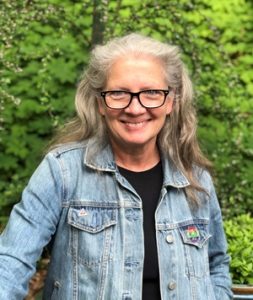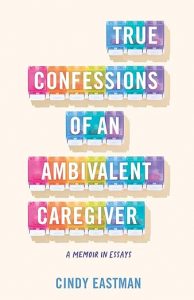Writing the Hard Stuff While it’s Happening
 (Or why I wrote about how hard it was to have my dad living in my dining room while he was still there.)
(Or why I wrote about how hard it was to have my dad living in my dining room while he was still there.)
For as long as I can remember, writing has been a way to process the experiences in my life. It’s also an essential philosophy for all my writing classes; writing is simply a tool we humans have in order to make meaning from the highs and lows in our lives. Even so, I know that when I am going through something really stressful, sitting down with my journal isn’t typically my first impulse. It’s more like drawing the covers up over my head and trying to escape for twenty minutes or so. But when my family agreed to take on the responsibility of caring for my dad in my home after my mom passed away suddenly from lung cancer, I first turned to, and then relied on, writing about all of it—good and bad.
If we had been organized enough to have a family meeting about it, the vote would have been unanimous: everyone thought it was the best option. A big factor in deciding to bring Dad over twelve hundred miles north from Florida to Connecticut was my sister and her health. When my mom was first diagnosed with what was then thought to be pneumonia and needed help caring for Dad, my siblings and I took turns flying in to help out. Soon after Mom died, the cancer Susie thought was in remission returned, and once she restarted treatment, there would be no way she could travel to help out had we left Dad where he was and continued tag-teaming our way through his care. So, my Connecticut home it was. We remodeled our dining room into a first-floor bedroom, including a stand-up shower where my front hall closet had been (because he wouldn’t be able to manage the stairs to the second floor). And then we crossed our fingers, hoping he’d at least make it to Christmas—a mere seven months away. It all sounded like a great plan.
Until it wasn’t.
Because he did make it to Christmas and the rest of the year of “firsts.” First anniversary without Mom, first Thanksgiving, first Christmas. Meanwhile, Susie’s treatments began to fail and after only a couple of weeks in hospice, she died a week after the one-year anniversary of my dad’s arrival. Then, on the one-year anniversary of Susie’s death, on our way to her favorite restaurant with her husband and son, Dad was so anxious to go, he stepped off the front porch without waiting for help and broke his ankle. This required a three-month stay at a rehab facility, then a transfer to an assisted living home because we couldn’t accommodate him in a wheelchair at my house. We brought him back with us in December of 2019 because he was at risk of running out of savings to stay there. Three months later, Dad, my husband, and I were locked down until Dad died at age 90 in February of 2021.
None of those four years were easy. I began writing about what it was like when we decided to take in my dad—and let’s be honest, it wasn’t as much “we” as it was “me.” I began recording all the things that came up as a way to process this very demanding responsibility and also vent a little steam. I knew that if I didn’t, the frustration, resentment, and even grief I was feeling would fester and grow. I remember thinking that I should probably keep some of this stuff to myself, given what the general consensus was regarding taking care of an elder or loved one—that I should be grateful. But I was exhausted. And kind of angry. And missing out on years of a whole different kind of plan of what living into my sixties was going to look like. I even wrote in the introduction of my book that “Giving up the family secrets while the family is still around to find out about it might offend or hurt someone, particularly my dad. But I’m not going to tell him.” And I believe I was able to keep much of what I was feeling from him by writing about it.
But even though I wrote about it, I didn’t publish it all. Some of the writing I did was only meant for my own personal edification. Sometimes writing isn’t meant to be shared at all, but used only as a means to inform further writing. When a book is written without having taken the time to understand the meaning of an experience, the raw feelings show up on the page—anger, revenge, accusations. Writing it all down but NOT publishing it all can still tell the story, but without the knee-jerk reactivity.
I knew I couldn’t wait until after my dad died to write our story because I knew, through the lens of loss and grief, it would be a very different one. Writing in the thick of a situation or setback ensures that the details get captured authentically. It’s the writer’s discipline to be able to retain those details in a way that brings meaning to an experience that many may identify with. It’s the difference between developing a writing practice as a way to record experience and simply documenting every ache and scream. A writer integrates such incidents not by pointing externally to “what happened to me” but by sharing the story of what happened and what it meant.
Writing about the cobwebs helps dispel them and allows the writer to write more clearly and meaningfully about a past, sometimes painful, experience.
—
Cindy Eastman is a writer and an educator.
Her career has taken a wide and diverse route from introducing computer skills to elementary schoolchildren, teaching freshman English as an adjunct at a community college to facilitating a writing course for seniors for the Osher Lifelong Learning Institute. In her weekly essay on Substack called Silver Linings, she discusses getting older with a sense of humor–a must!
Eastman makes her home in Connecticut with her husband, Angelo. Her second collection of essays, “True Confessions of an Ambivalent Caregiver” will be published by She Writes Press in Sept. 2024 and she is submitting an anthology on grief to publishers. She can be found writing or teaching unless she gets to spend time with her grandkids. Then all bets are off.
True Confessions of an Ambivalent Caregiver: A Memoir in Essays
 Written for caregivers of parents and spouses, this funny but brutally honest collection of essays from award-winning author Eastman challenges the romanticized notion of caregiving, portraying it as an elegant conflict that reshapes family dynamics.
Written for caregivers of parents and spouses, this funny but brutally honest collection of essays from award-winning author Eastman challenges the romanticized notion of caregiving, portraying it as an elegant conflict that reshapes family dynamics.
At first grateful to be able remodel the dining room of her family’s modest home in Connecticut to accommodate her eighty-six-year-old father for what everyone felt would be a short duration of care, Cindy Eastman ultimately experienced a whole gamut of feelings over the course of what turned out to be four years of caring for her dying dad. Caregiving impacts everyone, and this account—told in essays recorded before, during, and after the time Eastman’s father was with her—details that impact, not just on the primary caregiver but also the rest of the family.
One of the reasons Eastman committed to writing down her experiences was because she predicted that once her dad died, there would be a tendency to soften or even deny any of the negative and challenging times—and there were many.
As of 2020, more than 53 million adults provide homecare in this country, and the reality of that arrangement is different for every family. It is not, as some might suggest, a “noble gesture” but rather an elegant conflict—an intricate reassembling of the family dynamic that many people don’t ever see coming. In these candid, often poignant essays, Cindy Eastman brings all the emotions of taking on the challenging responsibility of caregiving a parent at the end of their life to the surface.
BUY HERE
Category: On Writing






























